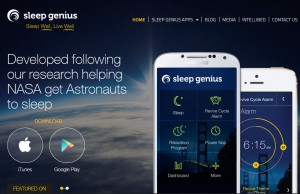Sleep Genius App Gets NASA Salute
By Erica Barnes / mHealthWatch
What began as a quest to help humans sleep in the International Space Station has become a technology soothing people worldwide.
Not only that, It’s also a celebrated “spinoff technology” in the latest edition of NASA’s prestigious annual publication, appropriately titled Spinoff.
The 2015 issue recognizes an array of cutting edge companies and products that began with research for NASA but ultimately led to technologies for life right here on planet Earth.
Designed to document “the diverse benefits our nation enjoys from its investment in aeronautics and space missions,” Spinoff selected Sleep Genius, a sleep aid app, as one of its showcase-worthy technologies.
It’s not just newborns and the elderly who sometimes have trouble getting to sleep. Astronauts at the International Space Station (ISS) had notorious sleep issues, caused by noise, light, sound, and other disruptions. The fact that the station’s location in space featured a sunrise or sunset almost every 45 minutes was just one reason why ISS occupants suffered chronic sleep deprivation.
NASA wanted to do something about it and so the agency funded research conducted at SUNY Stony Brook. In short, NASA wanted to discover the genesis of the problem — and then find a potential solution.
Neurologist Dr. Seth Horowitz was a member of the crack crew tasked with facilitating sleep in outer space.
Horowitz and his fellow scientists pinpointed the vestibular system as the place to seek answers and remedies. The vestibular system, says Horowitz, primarily contributes to our sense of balance. But it also is part of the complicated wiring that’s involved when humans sleep. That’s because three connected, semicircular tubes located in each of our inner ears work in constant unison with other physiology to act as a gatekeeper of sorts — sensing movements and communicating them through electrical signals that travel to the brainstem’s vestibular nucleus.
Horowitz started with hamsters, whose vestibular systems are similar to humans, testing a hypothesis: low-amplitude vestibular stimulation could alter sleep cycles. In other words, periodic loud noises, for instance, were sleep interrupters. But low level rhythmic sound and motion were sleep enhancers.
“On one end, high-amplitude, sudden vibration wakes you up,” explained Horowitz, “but these low-amplitude, periodic vibrations put you to sleep. You’ve got a psychophysical curve that covers all states of arousal and sleep. People experience this from the constant low rumble of a train, to cite one example.”
The technology Horowitz and his team created worked well for NASA astronauts. Next Horowitz turned his attention to commercial application, convinced the technology could help a large coterie of sheep-counters.
Horowitz enlisted composer Lance Massey (the creator of the T-Mobile ring tone) and together they created a set of classical music tracks incorporating everything the research had revealed about sound and sleep. Sleep Genius, the product of that collaboration, was launched in 2013.
Sleep Genius began selling an audio program of the same name as a downloadable smartphone app for the iOS and Android platforms. Today, having been downloaded more than one million times, it has a devoted user base of well rested adherents.
Sleep Genius is configured to benefit people of all ages. Horowitz says older adults generally are able to fall asleep but wake up a lot during the night; young adults tend to have the exact opposite problem. Adults older than 40 years of age start to lose their ability to hear high frequencies; babies tend to respond positively to high-pitch white noise.
“We’ve found a balance of frequencies that seems to address most of those factors for a wide group of people,” notes Horowitz.
NASA research has led to a plethora of products we now take for granted — like freeze-dried food, water filters, and memory foam. But none of them are any fun if you can’t get a decent night’s sleep.

